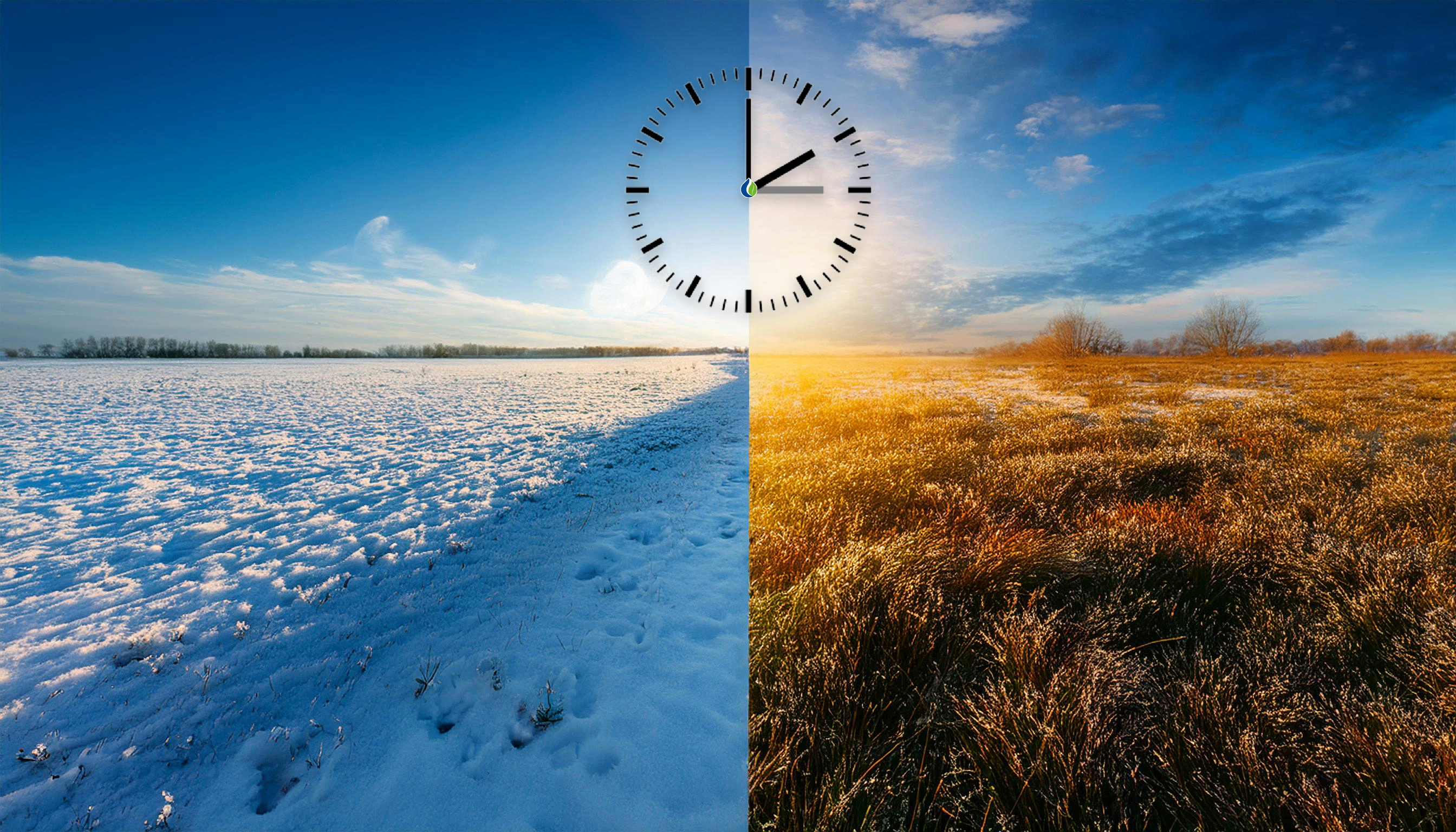
Twice a year, the clock goes forward or back an hour, and has done so for decades. Although this habit was originally introduced to save energy and make better use of daylight, today its effect is increasingly debated. For many people, adjusting the clock not only feels like an inconvenience, but also involves disruptions in our body's natural rhythms. After all, our internal biological clock is tuned to the natural course of day and night, and for some, this disruption can lead to sleep disturbances and reduced productivity. More and more voices are therefore advocating the elimination of these time changes. In this blog, we take a closer look at the impact of summer and winter time on our biological clock and why it may be time to leave this tradition behind, as well as what you can do to alleviate the suffering while it is not yet the case.
What is Daylight Saving Time
Daylight saving time is the period of the year when the clocks are moved forward one hour to enjoy longer daylight. This means the days feel “longer” because it gets dark later in the evening. In the Netherlands, the clock goes forward one hour in the spring, on the last Sunday in March, and back one hour to standard time, also known as winter time, in the fall, on the last Sunday in October. The idea behind daylight saving time is to save energy by making optimal use of natural light in the evening hours.
When was Daylight Saving Time introduced in the Netherlands and why?
Daylight saving time was first introduced in the Netherlands during World War I in 1916, when many European countries experimented with this measure to save fuel. Summer time was abolished after the war, but during World War II it was reintroduced by the occupying forces, again to save energy. After the war, however, daylight saving time did not remain in effect permanently and again disappeared from the Dutch time table.
It was not until 1977, during the oil crisis of the 1970s, that daylight saving time was permanently reintroduced. The idea was that by enjoying daylight an hour longer, less use would be made of artificial lighting and thus less energy would be consumed.
When exactly does Daylight Saving Time start and when does Winter Time start?
Netherlands
In the Netherlands, daylight saving time and winter time always start at the following times:
Daylight Saving Time: The clock is moved forward one hour on the last Sunday in March, at 02:00 at night. This makes it 03:00 a.m. The night then basically becomes one hour shorter.
Winter Time: The clock is set back one hour on the last Sunday in October, at 03:00 a.m. The night will be one hour shorter. This makes it 02:00 a.m. The night then basically becomes one hour longer.
Summer time thus lasts from the last Sunday in March to the last Sunday in October, after which winter time (also called standard time) is back in effect.
The rest of Europe
In the rest of Europe, almost all countries follow the same schedule for the introduction of summer and winter time, as in the Netherlands. This has been standardized by the European Union to avoid confusion and differences between countries. Therefore, the same applies to most European countries as to the Netherlands.
This system applies in all member states of the European Union and some other European countries that are not in the EU, such as Norway and Switzerland. The time change happens at the same time, but because of the different time zones, the time may vary from country to country.
Countries outside Europe often have different rules for summer and winter time, or do not use these adjustments at all.
The United Kingdom
Although the United Kingdom (England, Scotland, Wales and Northern Ireland) is no longer part of the European Union since the Brexit, it still follows the same dates for time changes as EU countries. But the times and terminology are slightly different:
Daylight Saving Time: In the United Kingdom, this is officially called British Summer Time (BST). As in the rest of Europe, the clock advances one hour on the last Sunday in March at 01:00 (in local time), making it 02:00 BST.
Winter Time: This is also known as Greenwich Mean Time (GMT). The clock is set back one hour on the last Sunday in October at 02:00 (BST), making it 01:00 GMT.
The economic benefits of introducing Daylight Saving Time
The original reason for the introduction of daylight saving time was economic in nature. By moving the clocks forward one hour in the spring, people would benefit from natural daylight for longer in the evening hours. This would lead to reduced use of artificial lighting and thus energy savings, especially during the period when electricity was scarce or expensive. In the 20th century, especially during the oil crisis of the 1970s, this argument was often made to justify daylight saving time.
In addition, it was thought that the longer evenings would benefit the retail and hospitality industries. People, with more daylight after working hours, would be more inclined to store, eat out or engage in other recreational activities, leading to an economic boost for businesses dependent on consumer spending. Industries such as tourism also benefited from the longer summer days, as people spent more time outdoors, leading to better attendance at activities and events.
While there are certainly positive economic effects, these are increasingly questioned today. Energy consumption savings have become less relevant with the proliferation of more efficient lighting technologies, such as LED lighting. In addition, the economic benefits are often weighed against the adverse effects on health and productivity, which can also have costs. In addition, it is dark longer in the morning, which can also have disadvantages.
The biological disadvantages of introducing Daylight Saving Time
The introduction of daylight saving time has significant biological disadvantages that can affect people's health and well-being. Disrupting natural circadian rhythms can lead to various health problems. Many processes in our bodies follow a daily 24-hour rhythm, such as sleep-wake rhythms. Other biological processes that are affected include hormone production, body temperature and metabolism, and all of these are strongly influenced by external factors such as light and dark. The mechanism responsible for this rhythm is called the biological clock or circadian clock. A disruption of this rhythm can lead to sleep problems and other health issues.
Daylight saving time
With the transition to daylight saving time, the clock is moved forward one hour on the night of the last Sunday in March. This means that people essentially lose an hour of sleep. For many people, this change can lead to a disruption in their sleep cycle. The short nights can result in sleep deprivation, fatigue and decreased ability to concentrate. Studies have shown that these disruptions can lead to an increased risk of cardiovascular disease, stress and even mental health problems such as anxiety and depression. Adjusting to the new time can also affect productivity because the body needs time to adjust to the new routine.
Winter time
Although winter time (aka standard time) basically offers another extra hour of sleep, the transition here is not without its drawbacks either. The return to winter time can lead to a shift in daily rhythms that can also lead to disruptions. The darker mornings can cause people to feel less energetic and alert, which affects their overall mood and productivity. In addition, the decrease in natural light in the evenings can contribute to feelings of gloom and even seasonal affective disorder (SAD) in some people. The combination of these effects can result in reduced quality of life and an increase in health problems during the winter months.
Relationship between the biological clock and the pineal gland
The pineal gland, a small gland in the brain, plays an important role in our circadian rhythm by producing melatonin, the hormone that regulates the sleep-wake cycle. Melatonin release is affected by light: in the dark, production increases, while exposure to light inhibits it.
Disturbances in the circadian rhythm, such as those caused by the introduction of daylight saving time, can lead to a disruption in melatonin production. This can result in sleep problems and fatigue, highlighting the impact of time changes on our health.
What can you do to ease the transition between Summer and Winter Time?
The transition between summer and winter time can be challenging for many people, but there are several strategies you can employ to minimize the disruption to your biological clock and help your body adjust.
Prepare for the time change: Start gradually shifting your sleep schedule a few days before the transition. Go to bed 15 minutes earlier or later each night, depending on the direction of the time change. This helps your body adjust gradually.
Light therapy: Take advantage of natural light, especially in the morning. Exposure to daylight helps reset your biological clock. In the evening, you can reduce exposure to bright light to signal your body that it is time to relax.
Supplements for better sleep: Consider taking supplements such as magnesium, which can help relax muscles and promote a good night's sleep. CBD oil is also a popular choice for those struggling with sleep problems, as it can help reduce anxiety and improve sleep quality. Also, tryptophan, an amino acid found in foods such as turkey, nuts and seeds, contributes to the production of serotonin and melatonin, which helps you fall asleep faster.
Relaxation techniques: Take time to relax before bed. This can include meditation, yoga or breathing exercises. Reducing stress can help you sleep better and stabilize your circadian rhythm.
Healthy sleep habits: Provide a comfortable sleep environment, with a cool temperature, blackout curtains and minimal noise distractions. Regular sleep schedules, even on weekends, can also help keep your biological clock in balance.
By applying these strategies, you can make the transition between summer and winter time smoother and minimize the negative effects on your body.
Conclusion
In recent years, there have been strong public calls to abolish summer and winter time in the EU. However, despite support from the European Parliament in 2019, it remains uncertain whether these changes will actually be implemented. National governments are unable to agree on standard time, making it seem like we are still dealing with annual time changes for now.
As long as these changes remain, it is important to implement strategies that will help you adapt to these time changes. By optimizing your sleep habits, using light therapy and employing supplements such as magnesium, tryptophan and CBD oil, you can minimize the impact of daylight saving time on your health. Stay alert to how your body reacts and adjust your routines to reduce the negative effects of these disruptions.
At Meditech Europe, we are here to advise and support you through the transition between summer and winter time with our high-quality supplements. Feel free to contact us for more information. We are happy to help you!









